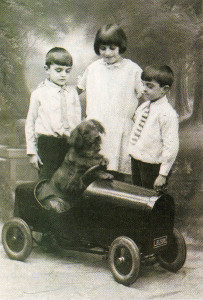
Born in 1918, I grew up in a family of nine children (seven boys and two girls) in Trinity Villa, an old rambling house in South Street, Yeovil. On the opposite side of the road was a primary school, and mother lived with the constant recitation of the multiplication tables in her ears; at least the pupils never forgot their tables!
Facing one side of the house was Holy Trinity Church, only separated by a low wall and hedge. My brothers, who all became choirboys or servers there, generally took the shortest route by hopping over this wall. While sitting at the very large scrubbed wooden table having our dinner at midday, it was a common sight to see a row of flowers float along the dividing wall: these flowers were the wreaths on the coffin being taken to the church for a funeral service.
One night, on his way to bed, my eldest brother Clifford saw from the landing window what looked like a man’s body in the churchyard. He rushed to the police station,
just around the corner, and when an officer arrived and aroused the drunken old tramp he opened his eyes, saying “Wa’er ma’er?” He soon knew what the matter was as he was yanked off to the police station. There was great respect for the police in those days, and it was a source of enjoyment to me, as a little girl, to see, on their exercise days, about 20 policemen marching up and down Union Street with the swish of their smart uniforms, the creaking of the leather of their highly-polished boots, and the crunching of those boots on the gravel of the street.
One market day this same brother, peeping through the garden hedge, saw, sitting among the laurel bushes leading to the vestry, a farmer’s daughter with a number of packets of farm butter placed around her. She was opening these packets, scraping off a portion from each and craftily combining these to create additional packets to sell, unbeknown to her father. Needless to say she kept out of sight of any officers of weights and measures!. On these market days we had to make sure our front gates were kept closed as herds of cows and flocks of sheep passed the house on their way to market, and some might well have had an additional meal from the plants of our front garden.
The local council arranged for a special road cleaning session at the end of such days. However, as most of the local tradesmen, the baker, the milkman, the greengrocer and the coal merchant all had their carts pulled by horses, there were many sources of manure for the roses.
From time to time the two youngest brothers, Ken and Den, and I (we were referred to as “the three little ones”) were scrubbed, dressed in our best clothes and dragged off to Witcomb’s, our local photographer, whose shop was in the area of the town called The Triangle. On one occasion we were accompanied by our dog Chummy, and a large toy car which had been a Christmas present to the boys. Chummy loved sitting in this car and his highlight was riding down South Street in it with the boys steering.
However, at the photographer’s, it seemed to take generations to obtain the desired result from the moment the operator got under his black cloth. Either one of us or Chummy would move at the critical moment, and with the long exposures needed at that time Mr. Witcombe – and we – were nearly driven mad by the many attempts necessary for success. Obviously the final outcome was successful, for the photograph remained above my mother’s bed at Trinity Villa until we left there.
An annual event was the church bazaar, and one year they ran a competition to find the best outfit created for both a boy and girl and made from coloured paper costing no more than 1/ 6d. My sister, Eileen, made me an outstanding costume with a crimpo-lene and poke bonnet of a Victorian lady. Unfortunately we got to the bazaar rather late and the boys’ entries had already been judged, but by mistake the winner, Wilf Gill, had been given the girls’ prize – a dressing table brush and comb set. However, perhaps because his sister liked it, he wouldn’t give it up when I won the girls’ first prize, and I received a football! Needless to say, my
brothers were ecstatic.
The lady who was the helper during some of Mother’s confinements one day sent my sister Eileen, the second eldest of the family, to get some groceries at the Home and Colonial stores. She was about ten, and wore her long hair in two fat plaits. She got so fed up awaiting her turn to be served that she rested against the counter. Horror of horrors! one of the plaits got caught up in the mechanism of the bacon machine. There was a great commotion among the rest of the customers as the machine was dismantled to release the greasy mass of hair. There were remarks such as: “We don’t want her hair in our bacon”. Poor Eileen; she had to get herself home and, unbeknown to the helper, creep to the bathroom to try to get the horrible mess out of her hair with cold water. There was no immediate hot water from the tap in those days – about 1918.
The life at Trinity Villa was one of continually unexpected episodes – many hilarious in retrospect. But one was unbearably sad when, in 1929, our beloved brother John, died from meningitis at the age of 18.
Mrs. Kathleen Hawkins, Reigate








